What Is a Democracy?
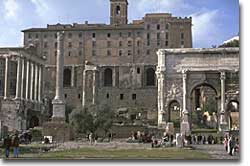
The ancient Romans had a working democracy for the early part of their history. The Forum in Rome is where political meetings and votes were held. The Forum can still be seen today, but most of its buildings are in ruins.
Nowhere is the word “democracy” mentioned in the Declaration of Independence or the U.S. Constitution. How could that be? Our government is a democracy!
Well, for one thing, the Founders actually feared democratic rule. James Madison expressed this attitude in Federalist Number 10:
. . . instability, injustice, and confusion . . . have in truth been the mortal disease under which popular governments everywhere perished . . .
In the late eighteenth century, rule by the people was thought to lead to disorder and disruption. Yet a democratically based government was seen as superior to the monarchies of Europe.
Democracies did not originate with the founding of the United States. The term democracy comes from two Greek words: demos (the people) and kratia (power or authority). So a democracy is a form of government that gives power to the people. But how, when, and to which people? The answer to those questions changes through history.
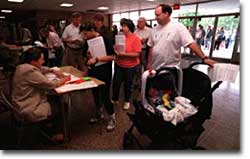
In present-day New England, many small towns hold town meetings in which issues important to the citizens are decided by vote. These meetings are one of the few instances of direct democracy that still occur today. These New Englanders check in at a town meeting.
Democracies are based on “rule of law.” The Ancient Greeks (particularly Aristotle) valued natural law, the notion that human societies should be governed by ethical principles found in nature. The Greeks are famous for practicing direct democracy, a system in which citizens meet to discuss all policy and then make decisions by majority rule. However, in Ancient Greece, only free males were considered to be citizens. So their democracy was certainly limited. Today direct democracy is practiced in New England town meetings, where all citizens of voting age meet to decide on important political matters.
But how could direct democracy work in a large, diverse population spread over a geographical distance? Generally, the answer has been that it can’t. In its place, the American Founders put “indirect” or “representative” democracy. In this system, representatives are chosen by the people to make decisions for them. The representative body, then, becomes a manageable size for doing the business of government. The Founders preferred the term republic to democracy because it described a system they generally preferred: the interests of the peopled were represented by more knowledgeable or wealthier citizens who were responsible to those that elected them. Today we tend to use the terms republic and democracy interchangeably. A widespread criticism of representative democracy is that the representatives become the “elites” who seldom consult ordinary citizens, so even though they are elected, a truly representative government doesn’t really exist.
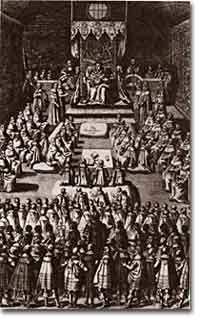
Britain has had a representative democracy since the seventeenth century. Members of the British Parliament are elected from across Britain and represent the interests of their constituents to the government.
Another modern version of democracy is called democratic centralism, a term made famous by Vladimir Ulyinov Lenin. As the leader of the Russian Revolution in 1917, he established a Communist government that allowed no private property to exist. All members of society were theoretically equal. However, Lenin considered a small “vanguard of the revolution” necessary to guide the people and establish order. So, under democratic centralism, a small group of leaders make decisions in the name of the people, based on their perceptions of what the people want and need.
Democracies have come in many shapes and sizes, as reflected by the different answers to questions of how, when, and to which people power is given. And although it is not mentioned in the Declaration of Independence or the Constitution, democracy clearly links to “rule of law” to form a basic principle that profoundly shapes American government.
Democratic Values—Liberty, Equality, Justice
Liberty and equality.
These words represent basic values of democratic political systems, including that of the United States. Rule by absolute monarchs and emperors has often brought peace and order, but at the cost of personal freedoms. Democratic values support the belief that an orderly society can exist in which freedom is preserved. But order and freedom must be balanced.
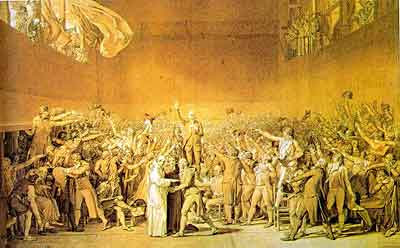
In the early days of the French revolution, the members of the third estate agreed to stick together in the face of opposition from the king and nobles. The “Tennis Court Oath” became the first step toward representative democracy in France.
The Influence of the Enlightenment
The American government has its roots in the seventeenth- and eighteenth-century Enlightenment in Europe, a movement that questioned the traditional authority of the monarch to rule. What gives one person the right to rule another? Enlightenment philosophers answered the question by acknowledging the importance of establishing order. They were influenced by the chaos of medieval times, when a lack of centralized government brought widespread death and destruction. Havens from invaders and attackers were necessary for survival, so weaker people allied themselves with stronger ones, and kings came to rule who provided protection in return for work and allegiance from their subjects.
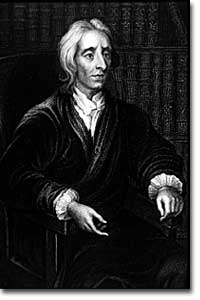
John Locke was the English philosopher who theorized that government was the manifestation of a general will of “the governed” that allowed the governed to change their governors at will. His book, Treatises on Civil Government, was very influential in the American revolution.
As order was established and new economic patterns emerged, people began to question the king’s right to rule. For example, John Locke, an eighteenth-century English philosopher, theorized that the right to rule came from the “consent of the governed.” Montesquieu wrote with admiration about three “branches” of government that checked one another’s power. Rousseau believed that communities were most justly governed by the “general will” or majority rule of their citizens. Though the philosophers believed that rulers were important for maintaining order, they questioned the sacrifice of individual freedom that they saw under European monarchs.
Two Kinds of Balance
Imagine a society in which everyone was perfectly free to do as he or she pleased. How long would it take for chaos to set in? Order implies a necessary loss of freedom if people are to survive. However, how far can order go? Democratic countries cherish INDIVIDUAL FREEDOM and generally believe that laws should not be REPRESSIVE; a little order can be sacrificed in the name of LIBERTY. So one kind of balance is between order and liberty.
Democratic societies also expect another kind of balance: a compromise between liberty and equality. Complete liberty logically leads to inequality. A strong or ambitious person might acquire more goods and property than another, and someone is bound to dominate. But the line has to be drawn before an individual seizes power that greatly restricts the liberties of others.
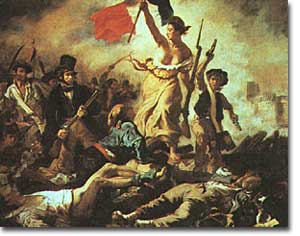
The ideals of the first French revolution also inspired the 1830 revolution in Paris. The ideas of “Liberty, Equality, and Fraternity” were immortalized in the three colors of the French flag. In Delacroix’s painting, Liberty is seen leading the people toward these ideals.
Shouldn’t governments help preserve some degree of equality for their citizens? But if they overemphasize equality, won’t they restrict their citizens’ liberty? For example, governments can bring about more equality by taxing rich citizens more than the poor, but if they carry their policies too far, won’t they restrict the individual’s freedom to strive for economic success? The balance between liberty and equality is an important cornerstone of democratic government.
In the late eighteenth century the Founders created the blueprints for the United States government in an effort to achieve these delicate balances—between liberty and order, and between liberty and equality. Their success is reflected in the continuing efforts to refine them. The formula has changed with time, but the framework provided by the Constitution and the values expressed by the Declaration of Independence remain the same.
Candela Citations
- The Nature of Government. Provided by: Independence Hall Association. Located at: http://www.ushistory.org/gov/1c.asp. License: CC BY: Attribution